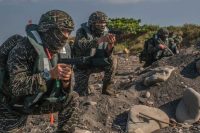¿Inminente invasión de Taiwan?
En las últimas semanas, se han producido dos hechos relevantes con respecto a Taiwan: por una parte, la presidenta de la Cámara de Representantes norteamericana, Nancy Pelosi, ha cursado una visita oficial a la isla, con lo que parece que su país ha abandonado la strategic ambiguity y se ha comprometido con su defensa; y por otro lado, la República Popular China ha realizado unas largas maniobras militares con imponente exhibición de poderío naval, misiles y fuego real.
En un artículo publicado en El Debate recientemente, anotaba cinco tropiezos en el año pasado de la diplomacia norteamericana, que reflejan su actual debilidad estratégica: la salida de Afganistán, el parón absoluto en el proceso de desnuclearización de Corea del Norte, los avances del castrismo-chavismo en Iberoamérica, el fracaso de la opción Guaidó en Venezuela y la guerra de Ucrania.… Seguir leyendo »













